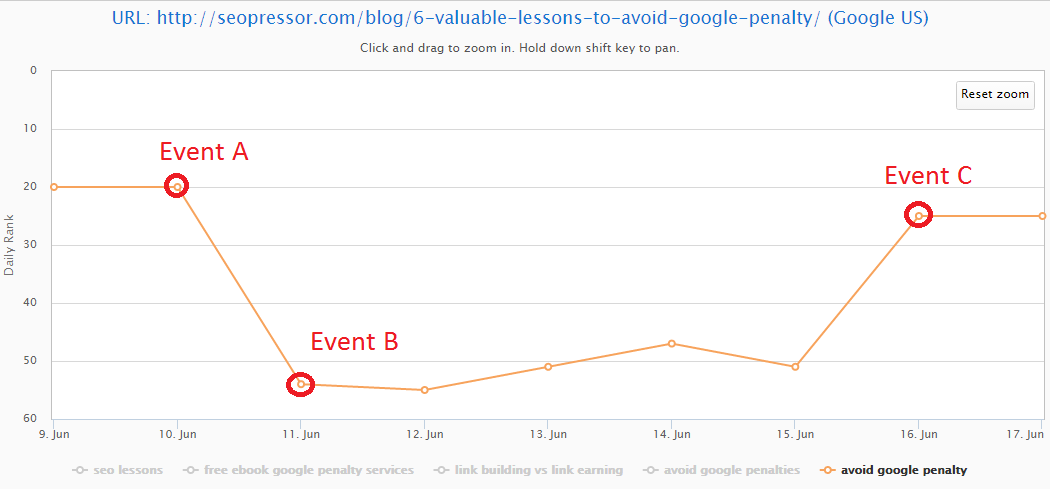Steph W. from SEOPressor


...help you check your website and tell you exactly how to rank higher?


73
score %
SEO Score

Found us from search engine?
We rank high, you can too.
SEOPressor helps you to optimize your on-page SEO for higher & improved search ranking.
By winniewong on June 28, 2015
Now, SEO communities have been playing with the idea of giving SEO bold tags to as many keywords as possible in the belief that doing so will help them to rank better. However, we know that this method is perceived by Google as being Keyword stuffing, which isn’t good!
So to clear the air, we have performed an experiment to show the effects of stuffing bold tags onto keywords, although the keywords density is low.
We will be using RankReveal for rank tracking throughout this experiment. SEOPressor will be used to show the bold tag over-optimization indication. The experiment began on 10 June 2015 by using the real article “7 Nifty Ways To Boost Your YouTube SEO”

The article “7 Nifty Ways To Boost Your YouTube SEO” was ranked 64th for “YouTube SEO” Keywords on 10th of June 2015 (Event D). But on 11th of June 2015 (Event E), as we expected, this article suffered a sudden rank drop to 84th due to the on-page tag changes.

As the picture above shows:
Event D 64th: Making changes to the tags for keyword “YouTube SEO” so that bold tags become strong tags. This process is done until the over-optimization warning is sounded by SEOPressor
Event E 84th: Observed a rank drop after the stuffing of strong tags for keyword “YouTube SEO”
Event F 63th: The article’s rank went back up to 63 again. This happened after we reverted the article back to its original form on 15th of June 2015.
On the 15th of June 2015, we decided to revert the article “7 Nifty Ways To Boost Your YouTube SEO” back to its original form. “Voila”! On 16th of June 2015 (Event F), the rank went back up to 63 again.
Interestingly, another article, “6 Valuable Lessons To Avoid Google Penalty” written by the same Author, suffered a significant ranking drop from number 20th to 51st on 11th of June 2015 (Event A) for the keywords “avoid google penalty”, on the same day that the ranking for “7 Nifty Ways To Boost Your YouTube SEO” dropped (see above image). Both articles have no significant relation to each other than the fact that both were written by the same author (Event B).

As the image above shows:
Event A 20th: Rank drop observed for “6 Valuable Lessons To Avoid Google Penalty” for the keyword “avoid google penalty’ on 11th June 2015. We suspect that both articles have a connection, and the rank drops may be more than just mere coincidence. (please refer to both images)
Event B 51th: Both articles are by the same author.
Event C 25th: Here, the ranking for the keywords “avoid google penalty” for the article “6 Valuable Lessons To Avoid Google Penalty” rose back up to the 25th rank, after the drop in rankings a few days ago. This happened on the same day that “7 Nifty Ways To Boost Your YouTube SEO” rose back to 63rd rank for keyword “YouTube SEO” after we reverted this article back to its original form on 15th June 2015. (please refer to both images).
Coincidentally, on the same day of 16th of June, 2015, when the rank for “7 Nifty Ways To Boost Your YouTube SEO” rose back to number 63rd, the ranking for the article “6 Valuable Lessons To Avoid Google Penalty” rose back to 25th as well. (Event C)
Bold or strong does not matter: We do not think that changing Bold tags to SEO strong tags affected the ranking drop, because as Matt Cutt mentioned, “There is no difference between bold and strong in SEO.”
So, we believe changing the bold tags to SEO strong tag is not a major contributing factor for the drop in ranking. (Please note that this is different from stuffing bold tags)
Be Careful about your author markup: It is not a coincidence that both articles experienced a drop in rankings around the same time. It is inconclusive whether Google will drop rankings for all articles by the same author if it determined that one article of the Author’s is perceived spammy content.
However, it can be said that there is a high chance that Google is keeping an eye on “class=”author-time” or “
According to Bill Slawski in one of the Google patents, he did mentioned that Google does take Authorship as a signal. If one of the content is altered to become spam content, Google will penalize all of the author’s content.
Say “No” to Spamming bold tags: Google is not taking the spamming of SEO strong tags lightly based on above observations from the case study demonstration. Stuffing bold tags will lead to rank drop for sure. This is especially true if you modify indexed content to improve ranking. Thus, any modification of indexed content should be done only if it’s a refreshing text, for adding quality sections or for adding quality outbound links.
That’s all! Did you experience the same patterns as we did? Let us know in the comments below. We’d love to hear from you.
Related articles you might like:
[This blog post was originally written and published by Brian on June 28, 2015. It is most recently updated by Winnie on Jun 02, 2020]
Updated: 14 July 2025


Save thousands of dollars (it’s 100x cheaper)

Zero risk of Google penalty (it’s Google-approved)

Boost your rankings (proven by case studies)
Rank High With This Link Strategy
Precise, Simplified, Fast Internal Linking.
